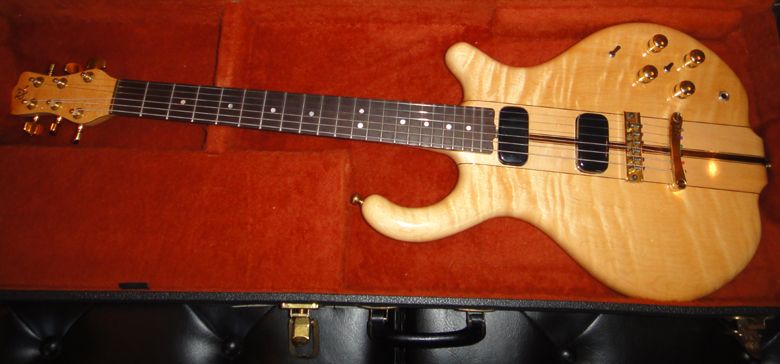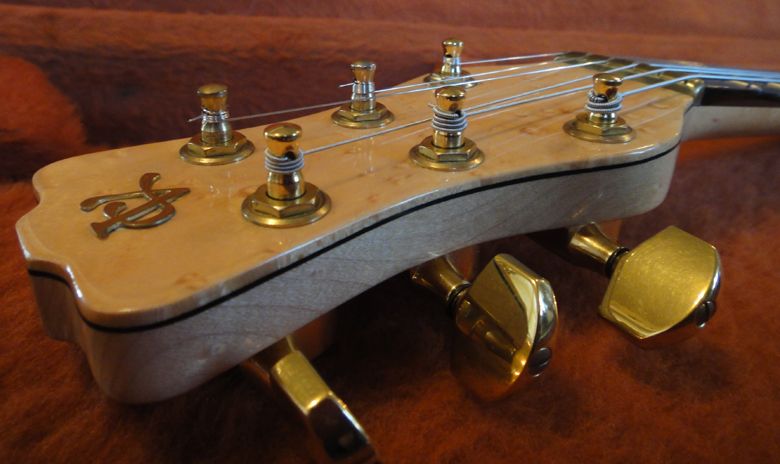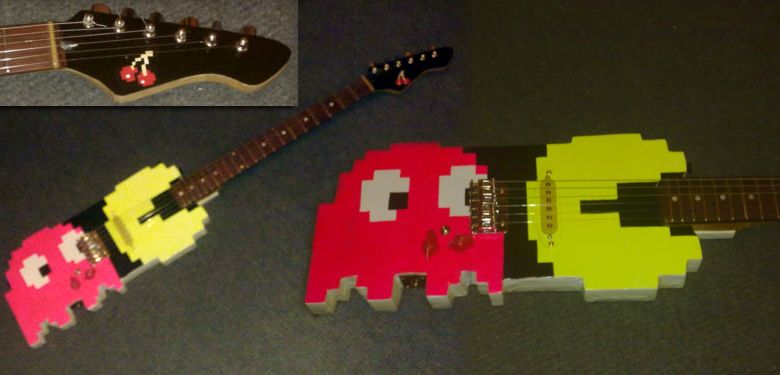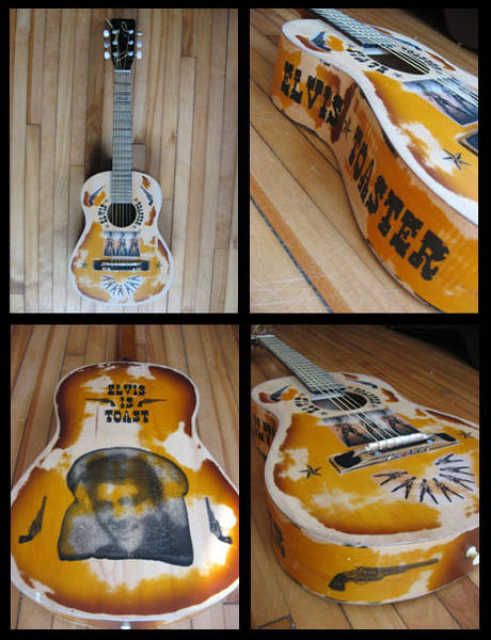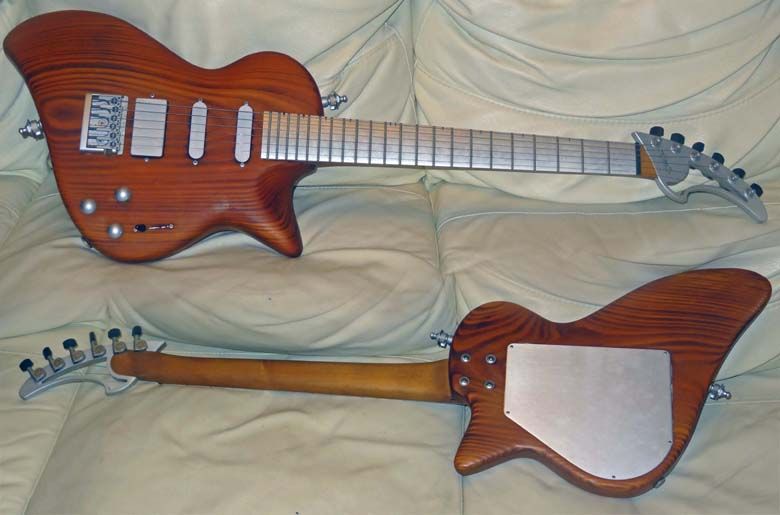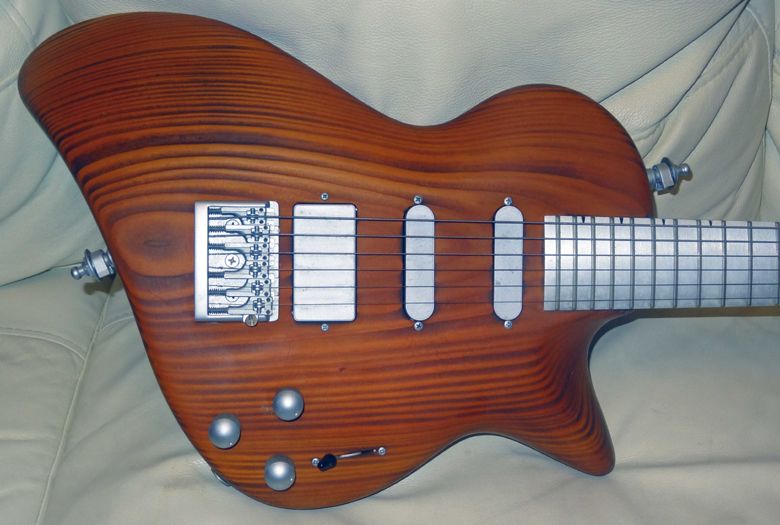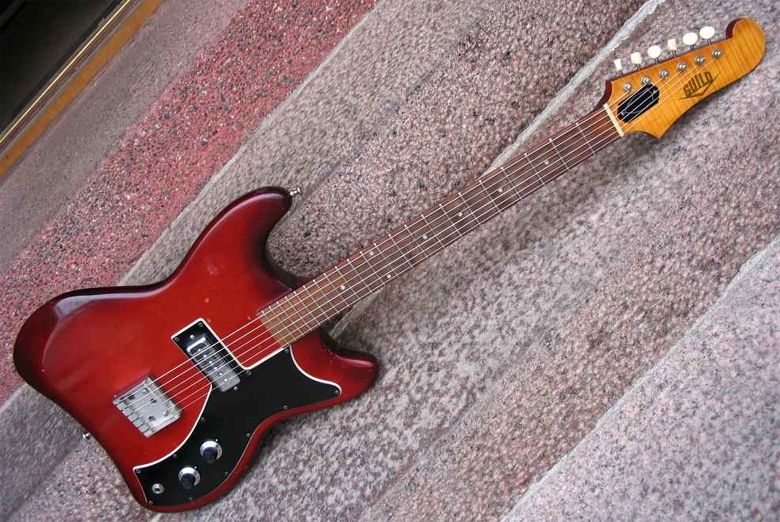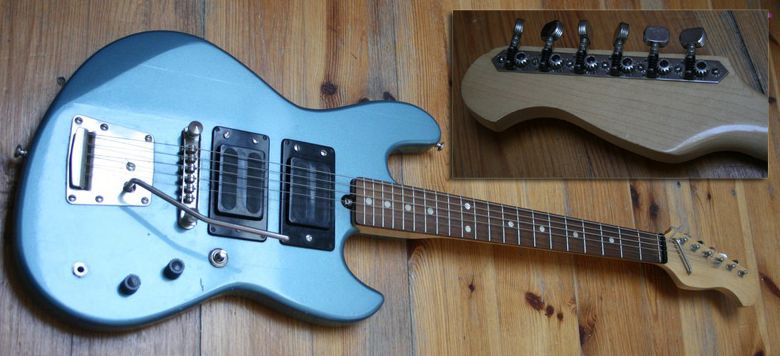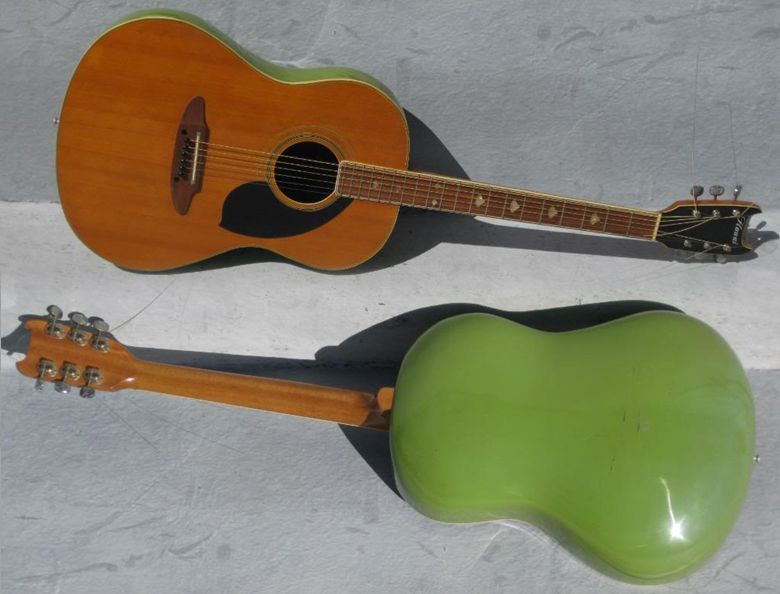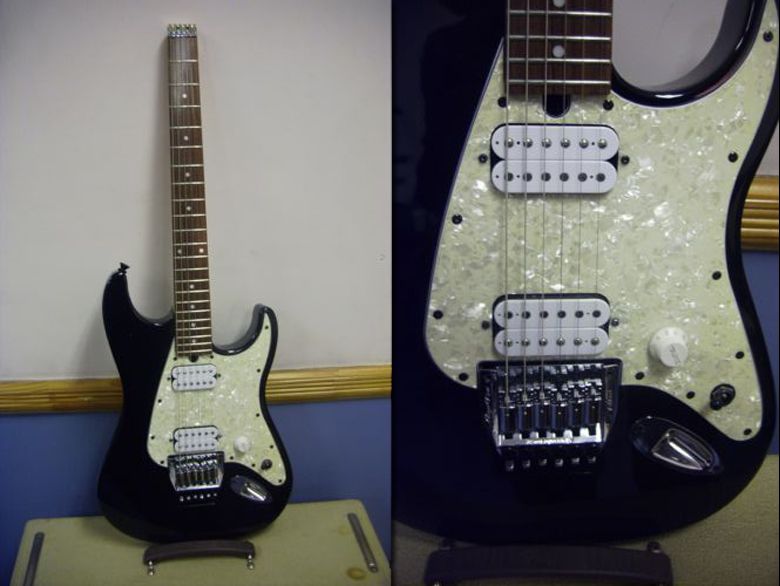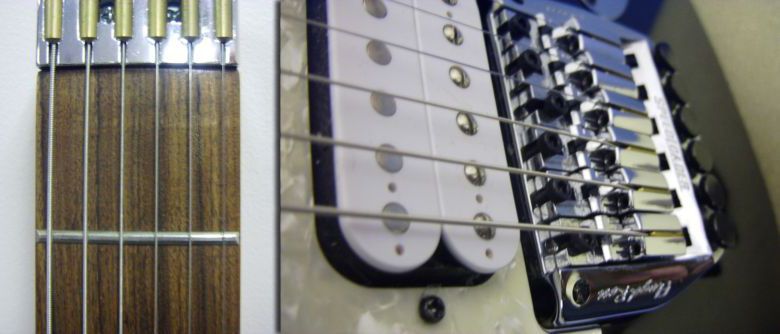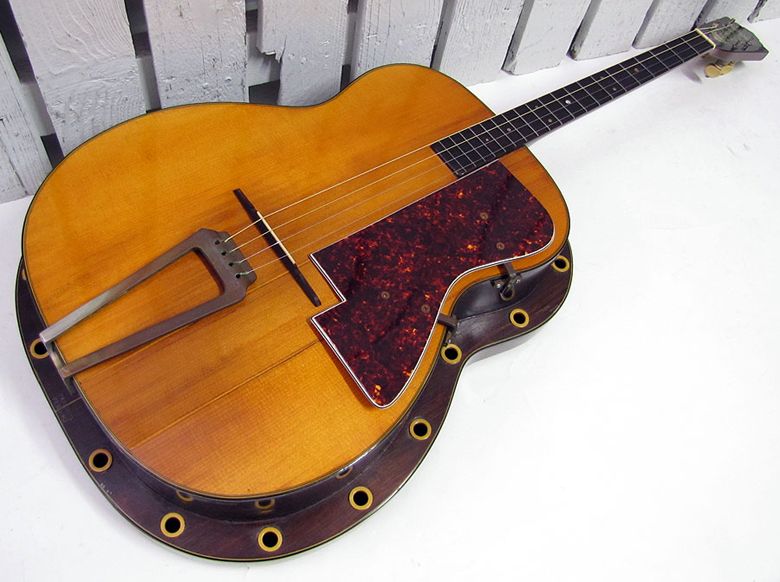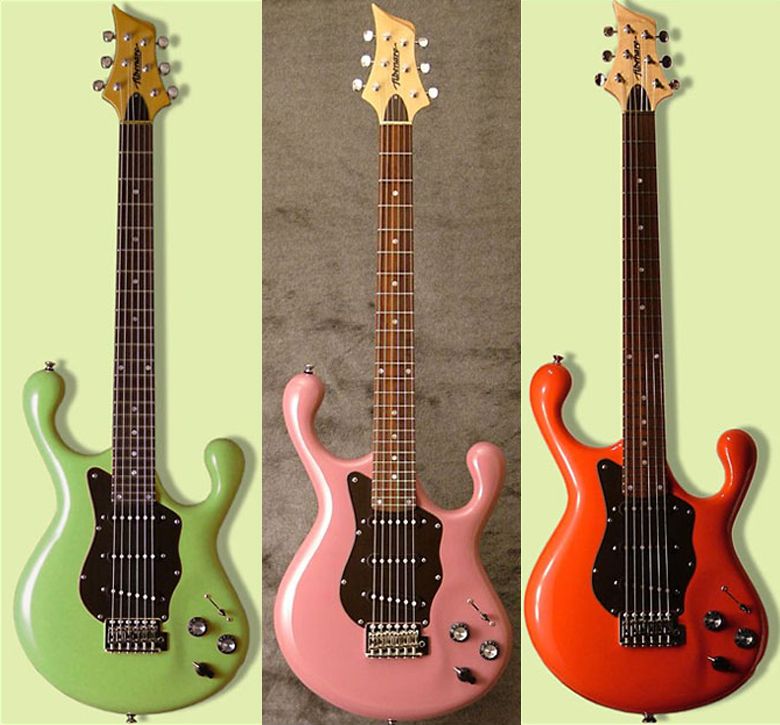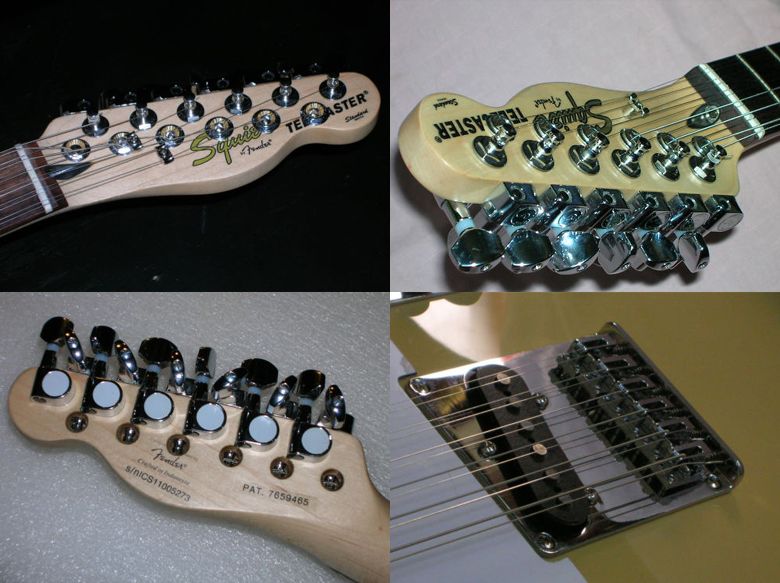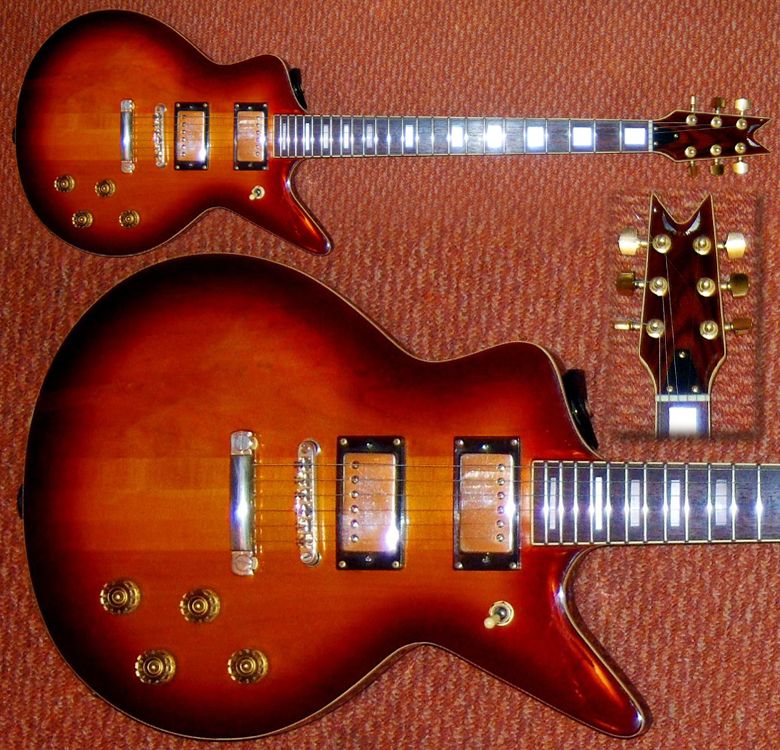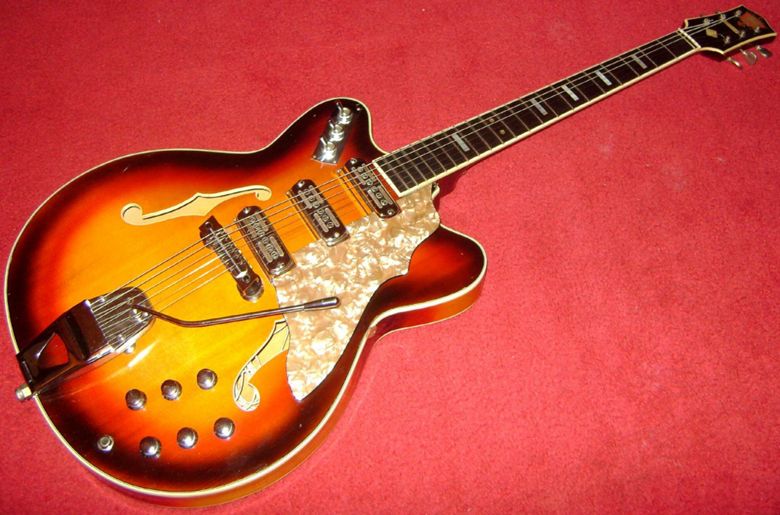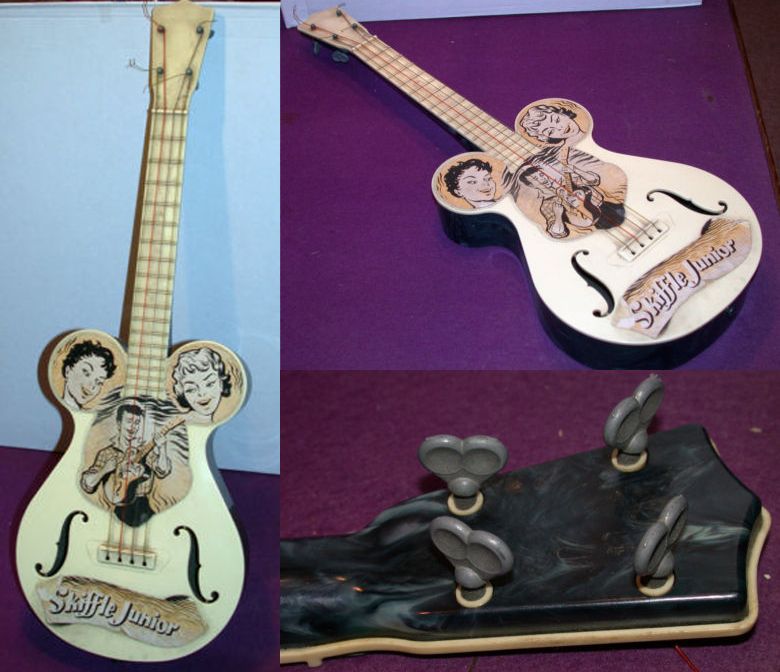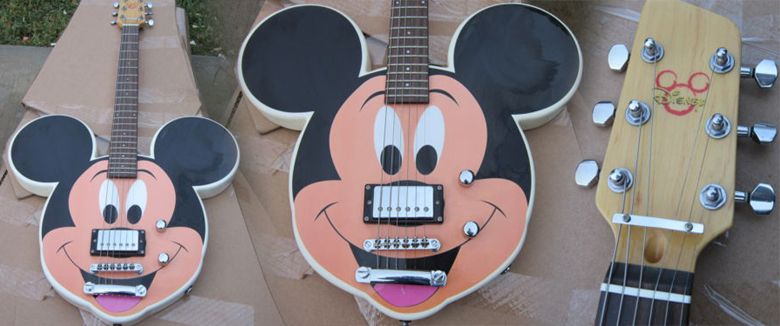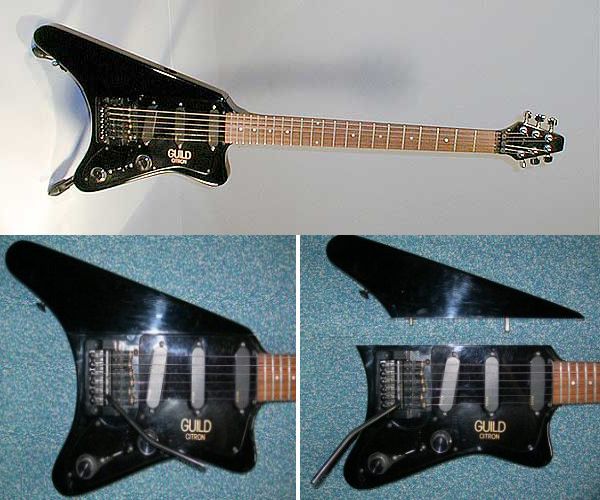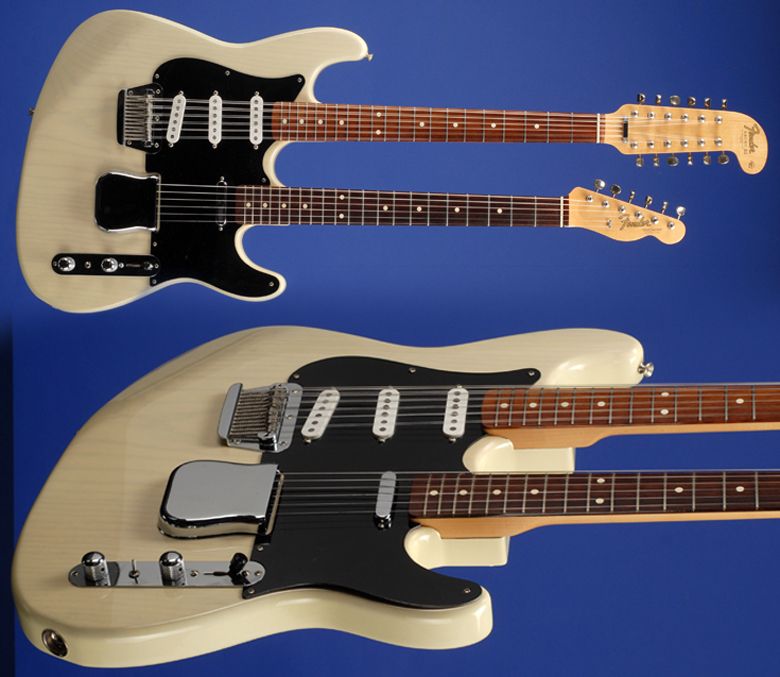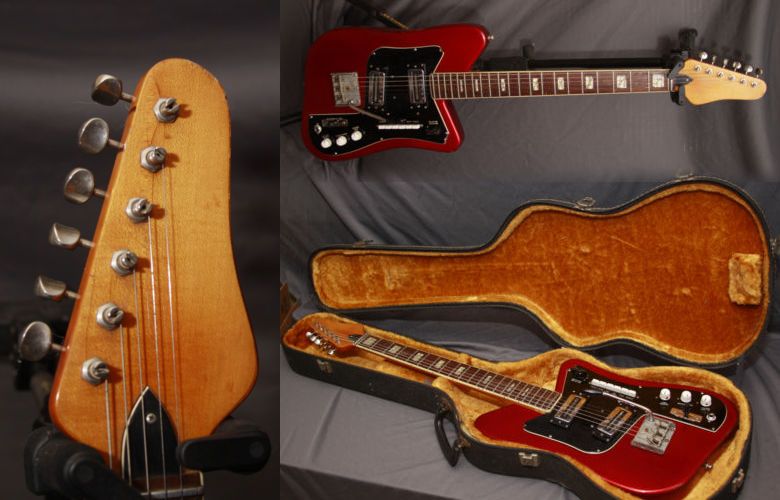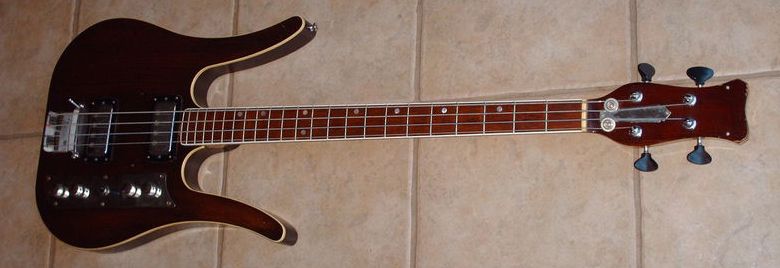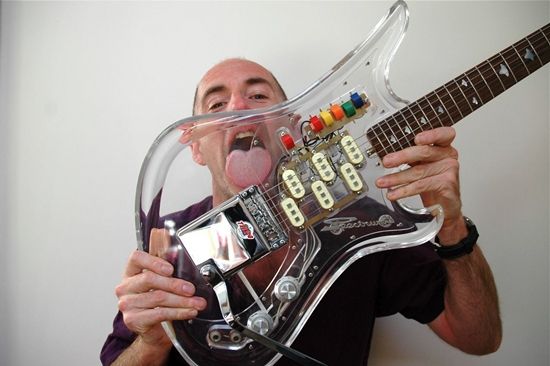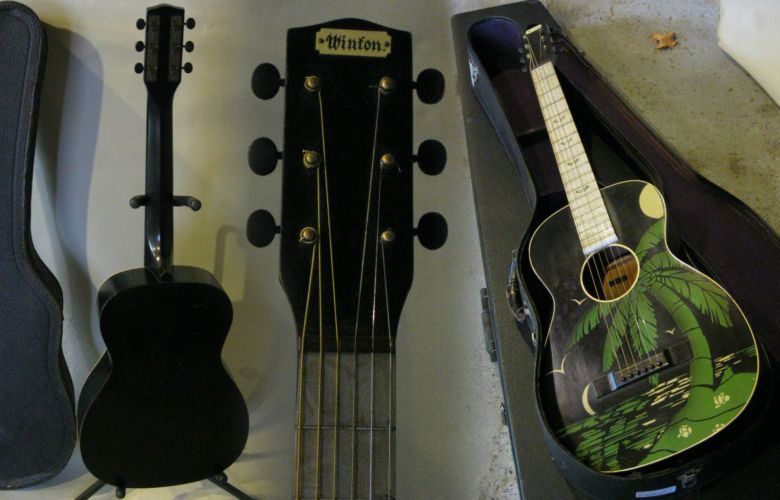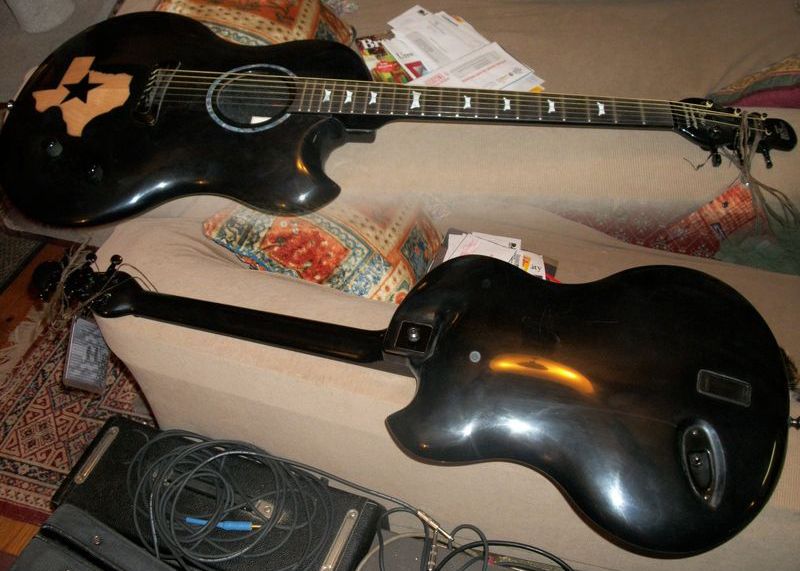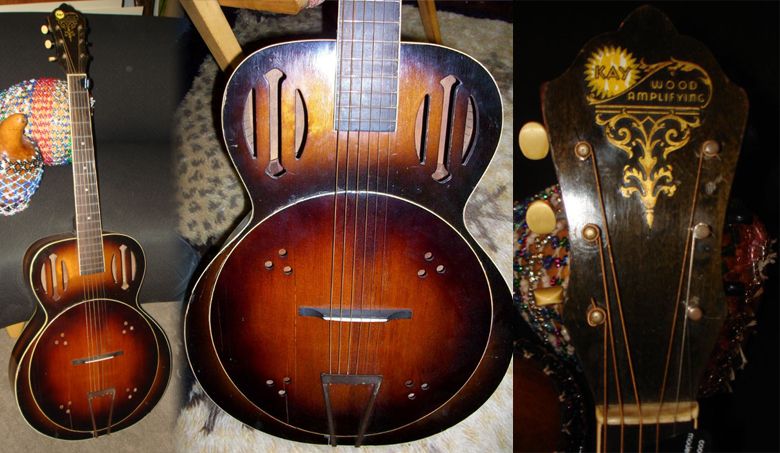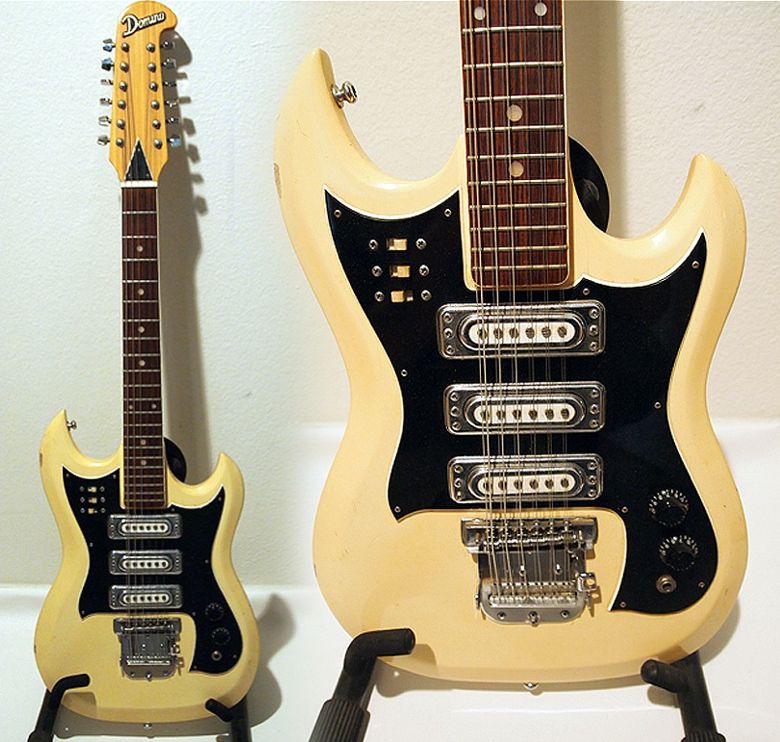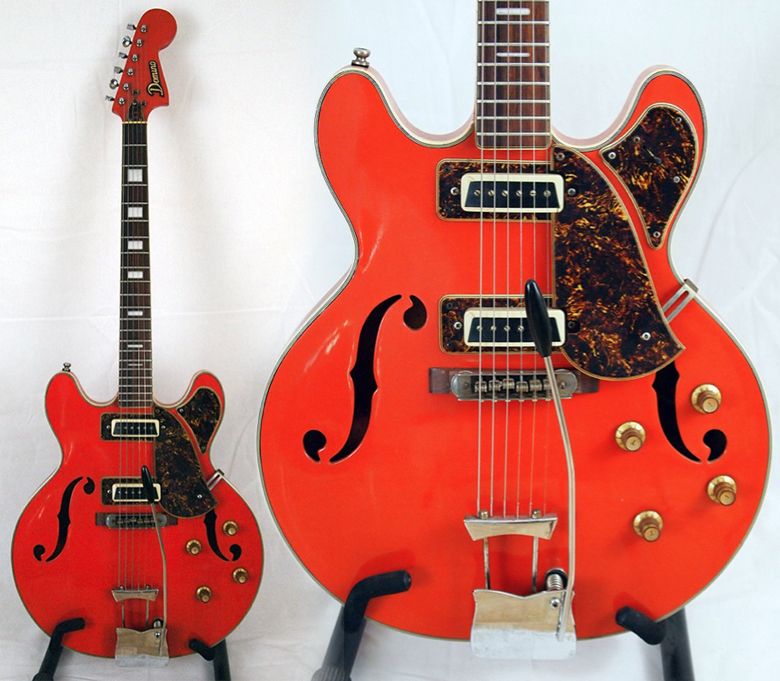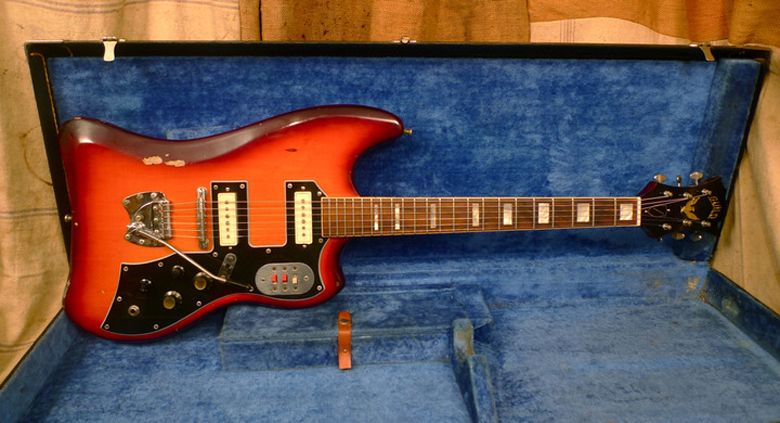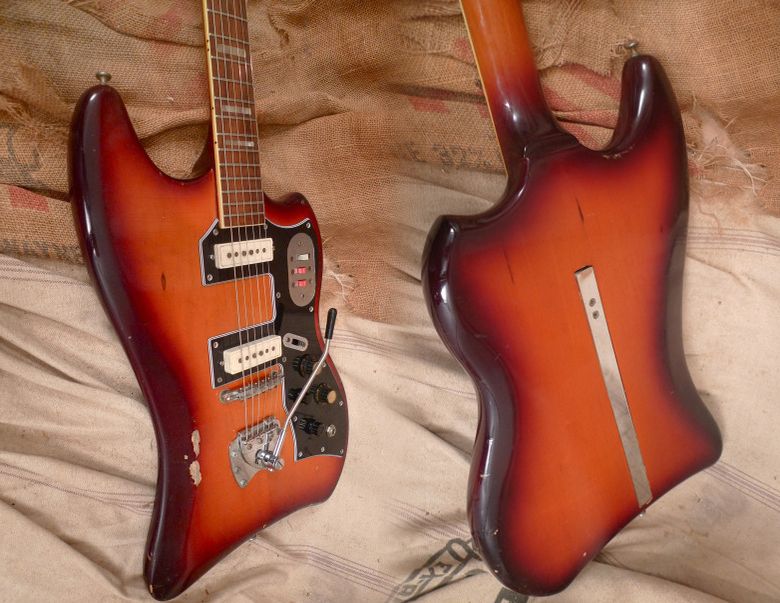© 2011, Guitarz - The Original Guitar Blog - now in its 10th year!
Veillette-Citron - another almost forgotten American maker of quality guitars
/
© 2011, Guitarz - The Original Guitar Blog - now in its 10th year!
6:13 AM | Labels: cool guitars, Veillette-Citron, vintage guitars, Your Guitars
For lovers of retro video games: the Pacman guitar
/
And - before someone comments - yes, I am aware of the other Pacman guitar that has appeared on just about every internet guitar forum devoted to "weird" guitars.
The above guitar is currently listed on eBay UK with an optimistic Buy It Now price of £330.
G L Wilson
© 2011, Guitarz - The Original Guitar Blog - now in its 10th year!
2:54 AM | Labels: one-offs, prototypes, wacky finishes, Weird guitars
The "Elvis Toaster" Harmony guitar
/
Guitarz reader Richard saw this guitar in the UsedOttawa.com classified ads:
Vintage, small scale Harmony acoustic guitar, stripped down and fancied up with Elvis images. One of a kind strummer for the Elvis completist. Comes with new bone nut and saddle for added twang, Andy Warhol print on front, and the infamous burnt toast image on back.It's definitely one to file under "Wacky finishes". With a price tag of $330 I think it's also one to file under "Optimistic sellers"!
G L Wilson
© 2011, Guitarz - The Original Guitar Blog - now in its 10th year!
8:17 AM | Labels: acoustic, customised, Elvis, Harmony, optimistic sellers, Relics, wacky finishes
Another Austrian guitar: Andreas Fierce Shark with Larch body and aluminium fingerboard
/
© 2011, Guitarz - The Original Guitar Blog - now in its 10th year!
4:04 AM | Labels: Andreas Guitars, Austrian guitars, unusual materials
Vintage & Rare guitar of the week: 1966 Guild S-50 Jet Star
/
This is currently being offered for sale via Vintage and Rare for a very reasonable €850.
G L Wilson
© 2011, Guitarz - The Original Guitar Blog - now in its 10th year!
3:07 AM | Labels: cool guitars, Guild, Vintage and Rare, vintage guitars
Telecaster hybridized with Rickenbacker lapsteel pickup - a real ugly duckling for sure
/
I'm going to be really lazy today (hey, it IS the holidays) and copy extensively from the eBay listing for this Tele/Rickenbacker hybrid:
This is a guitar which was constructed using:Likely this guitar is as amazing as the seller claims, but it's sure not going to win any beauty contests. Personally I think the placement of the volume and tone controls is a mistake - and I appreciate this was dicatated by the plate used from the Rickenbacker lapsteel. Nevertheless, I think he should have put the controls in the usual position for a Tele, and maybe plugged the holes in the lapsteel plate - else not used the plate at all if it is detachable from the pickup. I'm not just talking aesthetics here, those controls would get in the way where they are.
Fender MIM neck Serial Number MZ4013361 (hard rock maple)
Non-Fender Tele style Mahogany body
Rickenbacker horseshoe pickup from a Rickenbacker (old spelling is Rickenbacher) Model 100 lap steel
Lipstick pickup (4.9K) GFS from Guitar Fetish
Brass nut
Other misc parts from Guitar Fetish, staggered tuners and string tree, 3 way switch, tele jack cup, Tele dome knobs, cloth wiring.
This guitar was born in a Hamtramck second hand store where I found the Rickenbacker lap steel. At the time I could not even tell what brand it was because there were no tags, markings, or serial numbers on it. Also the body had been crudely modified, some wood cut away, strap buttons put on so it could be played slung around your neck more like a regular guitar. The store owner told me it had been owned by a friend of hers that had passed away. who was from the coal mining fields of Tennessee. He had also painted numbers on the metal fretboard. That genesis gave me the idea of putting this pickup on a telecaster style body.
Since the Rickenbacker is an old pickup with usage marks, I bought a Fender neck which showed a little natural wear. I then yellowed the face of the neck over the logo to make the neck looka little further aged. It is a very subtle effect. (I used gunstock oil infused with a little walnut dye.)
I picked up a mahogany body and modified it so the Rickenbacker pickup fit on it. At first I used a Gibson style wraparound bridge behind the rickbacker pickup. But it seems like some of that lap steel singing quality was missing. So I filled those holes, cut a little more wood and used the bridge integrated into the pickup. I also more tightly attached the neck to the body by using threaded steel neck inserts instead of the standard wood screws. You can search on ebay to see what inserts are are like.
The end result is that this thing sings like a woman! I took the guitar to my sister's house in Michigan's UP and played with her old-timey, bluegrass band. With the bluegrass band, I had to use the lipstick pickup because the Rickenbacker was too powerful, too bluesy. We were just playing an instrumental, but after the end of one song, someone asked "Who is singing?" No one was singing. It was the TeleRick. I was playing on the next song, and I thought I heard a woman singing vowels, I looked up from the fretboard and no, my sister (the only female musician present) was not singing. It WAS the guitar.
I had configured the guitar with a brass nut at first. It sounded great. I then switched to a solid plastic nut, and the open notes sounded more muffled than the notes held with the slide did. So, I put the brass nut back on. Also, when you play I think the brass affects the tone even more than just the open notes. I mean, the string does vibrate from the slide back to the nut unless you dampen it. The lipstick pickup loves the brass nut. I think the singing woman tone is a combination of the brass nut, lipstick pickup, mahogany body, threaded steel inserts, and the very solid Rickenbacker bridge. As I mentioned, the bluegrass people were not into the powerful Rickenbacker sound.
I put a 3 way switch on the guitar so you get the raw lipstick pickup, lipstick and Rickenbacker combined, and Rickbenbacker by itself. The tone and volume knobs only affect the Rickenbacker pickup. I did it this way for a couple reasons. If you wanted you could physically move the Rickenbacker pickup from the tele body to the Rickenbacker body, by only by snipping two wires. If I had integrated the tone and volume with the lipstick pickup, then more wires would have to be cut. Tonewise, the guitar rocks this way. The lipstick is a kind of a hollowed out singing acoustic sort of sound, you can play 4 strings together and they blend like a gospel choir. The Rickenbacker pickup has twice the output of the lipstick and is more raucous so you would only want to play 2 notes together (unless you are going for the heavy distortion). So you can do this multiple string sliding with the lipstick, and then flip the switch and go into a real heavier tone on the Rickenbacker pickup. You can tone down the Rickenbacker pickup with its controls to more closely match the lipstick if you want. The one pickup sounds like a logical extension of the other.
This guitar sounds so good, it could be the basis for a whole new unique style of playing. You can get lost flipping back and forth between them for hours..
The string height (action) is such that you can play the classic boogie woogie on the low strings from open to the 7th fret, and if you are sliding at the 5th fret, you can press down the strings behind the slide to get the missing notes in the scale, but when you are at the 12th fret you will be all slide all the time. Now, the action could be lowered a little. The bottom of the brass nut could be filed, maybe the neck truss rod could be used, but the Rickenbacker bridge is a little higher than the tele bridge, so the action will always favor the slide player. But that is not a loss on this guitar, because this is a slide players guitar.
In my heart of hearts, I believe that is a guitar born for slide and it will need a slide guitarist to properly appreciate it. That is why I am putting it on a month long listing. This special guitar requires a special person...
Currently listed on eBay with a Buy It Now price of $1,000.
Thanks to Andrew who saw this listed on eBay.
G L Wilson
© 2011, Guitarz - The Original Guitar Blog - now in its 10th year!
10:00 AM | Labels: Fender, hybrid guitar, lap steel, modifications, one-offs, Rickenbacker, Telecaster, weird customisations
Fender Telecaster Thinline JA-90 Jim Adkins signature guitar
/

The way it combines the simplicity of the good old Tele with a jazz guitar sophistication, how can one not love this guitar?
© 2011, Guitarz - The Original Guitar Blog - now in its 10th year!
1:00 AM | Labels: 2000s guitar, elegant guitars, Fender, signature guitar, Telecaster
1964 Joseph Rossmeisl SIR thinline archtop
/
10:00 AM | Labels: Austrian guitars, elegant guitars, schlaggitarre, thinline, vintage
James Chance, the Contortions and a Hagström Kent
/
Bertram
© 2011, Guitarz - The Original Guitar Blog - now in its 10th year!
12:00 AM | Labels: cool guitars, Hagstrom, Swedish guitars, video, vintage guitars, YouTube
Early PiL excellent video, featuring a Travis Bean Wedge and an Ampeg Scroll Bass
/
© 2011, Guitarz - The Original Guitar Blog - now in its 10th year!
10:00 AM | Labels: Ampeg, cool guitars, Travis Bean, video, YouTube
G L Stiles electric mandolin - possibly a one-off from legendary Miama-based luthier
/
Via the Guitarz Facebook page Bryan has asked if we can shed any light on this diminutive G L Stiles 4-stringer which comes complete with its original case. He initially thought it was a tenor guitar, but says that it's "very small as well about half the size of a regular guitar". That's too small for a tenor, so I'd wager that this was intended as an electric mandolin and borrows Fender's idea of using just 4 strings instead of 4 courses of paired strings as on a traditional mandolin. As to any particular information about this mandolin, that's nigh-on impossible, I'm afraid, for during the 1960s and 1970s Gilbert Lee Stiles built a number of what were essentially one-off instruments from his workshop in Miami, Florida. It's highly possible that this mandolin is the only one that he made.
More pics:
G L Wilson
© 2011, Guitarz - The Original Guitar Blog - now in its 10th year!
10:00 PM | Labels: electric mandolin, G L Stiles, Luthiers, mandolin, one-offs, vintage guitars
1980s Soviet-era Czechoslovakian-made Jolana Proxima guitar
/
The guitar appears to be in excellent condition, although strangely the Proxima logo is missing from the headstock. Pickups are a pair of huge humbuckers, identical to the single unit on my Jolana Disco. The chunky machine head buttons are another item these guitars have in common. The tremolo/vibrato is of the Jazzmaster persuasion, which I guess is in keeping with the Proxima's offset body design.
Thanks to Alex for bringing this guitar to my attention.
G L Wilson
© 2011, Guitarz - The Original Guitar Blog - now in its 10th year!
2:38 AM | Labels: 80s guitars, cool guitars, Czechoslovakian guitar, east-European guitar, Jolana, vintage guitars
1968 Kawai roundback acoustic - Japanese Ovation Glen Campbell copy
/
The downright weirdness of this guitar may be lost on most of you, but for those collectors of 1960s Japanese vintage, bizarre and lawsuit guitars, this thing is so bad it's good. What we have is a 1968 Kawai knockoff prototype of what was at the time one of the strangest and most novel pieces of guitar technology out there: the Ovation smooth-bowl Glen Campbell model. You gotta give it to the Japanese, they didn't waste anytime. But not only did they copy what is now perhaps the rarest and most sought after Ovation, they one-upped them as well in the strangeness category. First off, the smooth FRP resin bowl is LIME GREEN! On top of that, the neck is triple-bound, the headstock is pointy and devilish and capped with three-ply laminate and an awesome Kawai emblem, and the fingerboard is inlayed with upside down Teisco Spectrum 5 inlays (makes perfect sense as the Kawai factory was turning out those Teiscos at the time). And if that isn't cool enough, the tuning keys have CLEAR enclosures. Talk about space age tech.Currently listed on eBay with a $400 starting price and a Buy It Now of $600.
Thanks to Jaimie Muehlhausen for bringing this one to my attention.
G L Wilson
© 2011, Guitarz - The Original Guitar Blog - now in its 10th year!
2:08 AM | Labels: acoustic, Japanese guitar, Kawai, Ovation, prototypes, Teisco, vintage guitars
David Bowie's lost 1973 Top of the Pops performance of The Jean Genie
/
guitarz.blogspot.com:
In the late 1960s and early 1970s, the BBC had this ridiculous policy of wiping videotapes of programmes after broadcast - supposedly so as to save storage space and to enable tapes to re-used. In this exceedingly short-sighted move many classic TV programmes have been lost possibly forever (which is a particular bug bear of fans of the classic Sci Fi serial Doctor Who). How the BBC didn't ever envisage the onset of the domestic video market is completely beyond me. Anyway, the above clip of David Bowie performing "The Jean Genie" on Top of The Pops was one such clip believed to have been wiped and lost forever. Thankfully for us, John Henshall, the cameraman who shot the clip had a copy of the videotape in his personal collection. He had been unaware all these years that this particular performance was missing from the BBC's own archives. This clip was broadcast for the time since 1973 on last night's edition of TOTP2 on BBC2 here in the UK. (Read more here).
Note that the version of the song that appears here is quite different from either the single or album recordings, and features a great solo from the late great Mick Ronson on guitar.
G L Wilson
© 2011, Guitarz - The Original Guitar Blog - now in its 10th year!
5:19 AM | Labels: David Bowie, video, YouTube
1947 National New Yorker lap steel guitar, Art Deco design in Tuxedo finish
/
I always think that lap steel guitars were ahead of their time in some ways. Whilst they didn't altogether abandon the traditional hourglass guitar shape, makers did experiment with a whole variety of different shapes and designs whilst contemporary "Spanish" style guitars (i.e. played in the regular way and not lap steel style) had ultra conservative designs for the most part. And then there's the hotly debated question of who developed the first solidbody electric guitar. Was it Leo Fender with the Broadcaster/Esquire? Was it Les Paul? Or was it even some obscure Norwegian guitar manufacturer? I have to wonder why so much noise made about this when it seems that lap steels had abandoned the acoustic resonating sound box ages before Les Paul or Leo Fender had their brainwave ideas.
This particular lap steel is currently listed on eBay Australia with a Buy It Now price of AU $1,300 (Australian dollars).
G L Wilson
© 2011, Guitarz - The Original Guitar Blog - now in its 10th year!
4:43 AM | Labels: cool guitars, lap steel, National, vintage guitars
Floyd Rose headless Strat-like guitar with (Shock! Horror!) hardtail bridge
/
This guitar was said to have been originally priced at $500 (the seller doesn't tell us when) and is currently listed on eBay with a starting price of $175.
G L Wilson
© 2011, Guitarz - The Original Guitar Blog - now in its 10th year!
1:50 AM | Labels: Floyd Rose, headless
1930s Paramount L-Style Tenor guitar with "double" body - made by Martin
/
G L Wilson
© 2011, Guitarz - The Original Guitar Blog - now in its 10th year!
7:48 AM | Labels: acoustic, antique guitars, innovations, Martin Guitars, Paramount, Tenor guitar, vintage guitars
Vintage & Rare guitar of the week: Fibernare Erotic Regime from Hungary
/
Fibernare Guitars are made in Hungary by the Benedek brothers. In the 1980s the three brothers Attila, Csaba and Árpád, disparaged by the price and availability of electric guitars in their country were encouraged by their father to build their own. Other guitarists took notice of their self-built instruments and very soon they were building guitars for others too. Eventually this led to the establishment of Fibenare Guitars Co. in 1998.
The Fibernare Erotic Regime is the Brothers' take on the traditional three singlecoil pickup guitar, and thankfully looks very unlike the most famous exponent of that species of guitar. The Regime is part of Fibernare's "Erotic" series; with those curves you can see where that name comes from. The sculpted fluid-like body design looks as if it could be molded from some kind of high density polymer, but is in fact carved alder. The neck is, appropriately Hungarian alder; it's a bolt on design with a sculpted heel to ease access to the highest of the 24 frets.
The Regime is super lightweight at only 6 lbs and has a cunning control layout allowing the player to morph seamlessly between the most glorious Strat and Tele tones with the greatest of ease. The controls consist of volume and tone pots, 5-way pickup selector, and 3-way rotary switch which allows for the following settings:
1) Front position on rotary: standard strat 5way selection; 2) Middle position on rotary: neck and bridge pickups wired together in the 1st and 5th positions, 2nd and 4th positions is all 3 pickups, 3rd position is middle pickup; 3) Rear position on rotary: neck pickup phase inverted (PI) and wired to the output so: 1st position PI neck pickup, 2nd and 3rd position PI neck with middle pickup, 4th position PI neck with middle and bridge pickups, 5th position PI neck with bridge pickup.
The Fibernare Erotic Regime is available via Vintage & Rare priced at €2150.
G L Wilson
© 2011, Guitarz - The Original Guitar Blog - now in its 10th year!
9:10 AM | Labels: cool guitars, east-European guitar, Vintage and Rare
1960s Mr. Peters Batwing guitar with the patented Sceusa assymetrical neck
/
In cross section, the Sceusa neck's profile is asymmetrical with the thickest section being behind the bass strings, so that the back of the neck tapers from the bass side to the treble side. The concept was developed to allow the player to fit the neck to the arch between the thumb and forefinger of their left hand. In practise it is said to have worked well enough for those players who like to hook their thumb over the fingerboard, but for playing barre chords with the thumb at the back of the neck it posed problems.
This guitar is currently being offered for sale on eBay with a Buy It Now price of $25,000.
G L Wilson
© 2011, Guitarz - The Original Guitar Blog - now in its 10th year!
4:38 AM | Labels: innovations, Mr. Peters, prototypes, vintage guitars
Heavily modified el cheapo Epiphone Special Plus
/
Thankfully we have no worries in this instance for here we see what was a vaguely Les Paul-style very basic bolt-on neck Epiphone Special Plus which surely has been enhanced by the modifications performed on it. This is a cheap guitar that has been vastly improved through modification. This is the type of self customization that we like to see on Guitarz.
The eBay seller describes the work carried out on the guitar:
Currently listed on eBay with the auction due to finish later today. Bidding has been keen already, although I doubt it'll sell for big money. Bidding is at $127.50 at the time of writing.The body was cut in half. The inside was routed to leave roughly 1/2" sides, a 1/4" top and back, and a 4" solid core running from the neck pocket to the end of the stop tail. A sound hole and control access holes were cut in the top. The body was re-glued and then routed for a middle pickup. The finish on the neck is still the factory polyurethane, but the body was stripped and refinished in nitrocellulose. The body finish is thin and a little bit coarse in some areas. An aluminum pickguard was added, along with aluminum truss rod, control cavity and jack plates. The stock pickups were pulled and replaced with a set of three handmade humbucker sized blade single coils built around exposed alnico 5 firebird magnets. One master volume knob, one master tone knob and three individual on/off switches for each of the pickups.
G L Wilson
© 2011, Guitarz - The Original Guitar Blog - now in its 10th year!
3:40 AM | Labels: customised, Epiphone, Les Paul, modifications
How to fit 12 strings on a Telecaster without swapping out the neck
/
Neat, but I wonder how fiddly it would be to change strings?
This Squier Telecaster 12-string conversion is currently listed on eBay with a Buy It Now price of $529.99.
G L Wilson
© 2011, Guitarz - The Original Guitar Blog - now in its 10th year!
11:26 AM | Labels: 12-string, customised, Squier, Telecaster
Stunning Wandrè Davoli Scarabeo
/
© 2011, Guitarz - The Original Guitar Blog - now in its 10th year!
7:35 PM | Labels: cool guitars, Italian guitars, Metal neck, vintage guitars, Wandre
Dean Cadillac with small 'shrimpfork' headstock
/
I was having a whizz around the Guitarz site - as you do - and I came across the black '81 Dean Cadillac, so here's mine which I picked up around 14 years ago. It's all original, with a 2-octave thru-neck, gold-coloured (plated?) hardware and the smaller 'shrimpfork' headstock, which seems to frowned upon by most Dean enthusiasts; personally I prefer it - the larger 'V' headstocks appears too big to me, giving something of an unbalanced look. I don't know what year the guitar was produced, or the country of manufacture (I'm pretty sure it's not USA made) but I'm led to believe that Cadillacs were only made with those headstocks between '83 and '85.I confess I don't know a great deal about the particulars of the various Dean guitars. I always quite liked the large headstocks, although there's no way you'd get a straight string-pull on one of those, so I can understand why they experimented with a more sober design. If anyone out there can help Dave with his questions, please leave a note in the comments below.
Maybe you can shed a little more light.
Cheers,
Dave.
G L Wilson
© 2011, Guitarz - The Original Guitar Blog - now in its 10th year!
9:50 AM | Labels: 80s guitars, Dean, Your Guitars
1960s Fasan semi-hollowbody three-pickup electric guitar - German or Italian?
/
Fasan (which means Pheasant, by the way) were a German guitar manufacturer and I see no reason to doubt that this guitar was built anywhere but in Germany.
Currently listed on ebay with a Buy It Now price of $679.95.
Thanks to Luke Tildsley who saw this guitar on eBay and made us aware of it!
G L Wilson
© 2011, Guitarz - The Original Guitar Blog - now in its 10th year!
2:44 AM | Labels: cool guitars, Fasan, German guitars, semi-hollow body, vintage guitars
National Resolectric
/
3:59 PM | Labels: faux vintage, National, resonator
1950s Selco "Skiffle Junior" plastic toy guitar or ukulele - Mickey Mouse in disguise!
/
The Skiffle Junior dates from 1956. Perhaps they were just going along with the current trends. To begin with Disney was popular, then the Skiffle craze came in and so they altered the design. A few years later they would issue the more famous Selco Beatles plastic guitar.
Currently listed on eBay UK with a starting price of £45.
G L Wilson
© 2011, Guitarz - The Original Guitar Blog - now in its 10th year!
3:33 AM | Labels: acoustic, Selco, toy guitar, Ukulele, unusual materials, vintage guitars, wacky finishes
Mickey Mouse electric guitar
/
Currently listed on eBay with a Buy It Now price of $399.99.
And don't forget to check out the original Mickey Mouse Club Mousegetar!
G L Wilson
© 2011, Guitarz - The Original Guitar Blog - now in its 10th year!
8:27 AM | Labels: Promotional guitars, wacky finishes, Weird guitars
Guild X-92 Harvey Citron Breakaway travel guitar from 1985 fully loaded with EMG pickups and Kahler trem
/
The guitar is listed on Gbase priced at $3,430. I appreciate it may be a rare beast but in the current financial climate I can't see anyone snapping it up soon unless they are rabid Guild collectors.
G L Wilson
© 2011, Guitarz - The Original Guitar Blog - now in its 10th year!
4:01 PM | Labels: 80s guitars, Guild, travel guitars
Vintage & Rare guitar of the week: Fender Custom Shop doubleneck Telecaster / Electric XII
/
This unique double-neck Telecaster / Electric XII weighs 13.40 lbs. and is a one-of-a-kind instrument specially designed and built by Master luthier Fred Stuart in late 1991 (completed in January 1992). The guitar features a beautiful asymmetrical double-cut, one-piece see-thru blond light-ash body with wonderful bluish 'veins' showing through. On the Telecaster side, rounded edges on the back and on the Electric XII, a contoured edge on the bass side, so that the body contours reflect the half of the instrument they represent. Both of the necks are hand-carved from solid lightly-figured maple and have 'slab' rosewood fretboards (the Tele fretboard is dark rosewood, the Electric XII fretboard is a lighter shade. The Telecaster neck has a wonderfully thin-to-medium profile (similar to a '66) and a nut width of just under 1 11/16 inches. The Electric XII neck has a very comfortable medium profile and a nut width of just under 1 11/16 inches. Both have a scale length of 25 1/2 inches and 21 medium frets with white dot position markers. The Telecaster headstock has the Fender mid-sixties "Transition" logo in gold with black trim with "Telecaster" and "Pat 2,573,254 3,143,028" The Electric XII "hockey-stick" headstock also has the Fender "Transition" logo in gold with black trim "Electric XII" and "Pat 3.143,028 2,960,900 3,177,283 & Pat Pend."I quite surprised that the word "Stratocaster" doesn't get mentioned anywhere, for surely the "Electric XII" half of the guitar is itself a hybrid between an Electric XII and a Stratocaster. Certainly, the upper body shape, pickguard shape, and three singlecoil pickups in the legendary Strat layout all scream "STRATOCASTER"! Nevertheless, it is an interesting piece, and is not a combination that I have seen before from the Fender Custom Shop. It's only really the "hockey stick"-headstocked neck that is in any way reminiscent of the Fender Electric XII.
This guitar is available via Vintage & Rare priced at €12822.
G L Wilson
© 2011, Guitarz - The Original Guitar Blog - now in its 10th year!
8:22 AM | Labels: 12-string, custom, doubleneck, Fender, one-offs, Stratocaster, Telecaster, Vintage and Rare
1964 Multivox / Premier Scroll guitar with Rowe / DeArmond pickups
/
Currently listed on eBay with a starting price of $849.
G L Wilson
© 2011, Guitarz - The Original Guitar Blog - now in its 10th year!
10:00 PM | Labels: Multivox, Premier, vintage guitars
Vintage 1960s solidbody electric guitar - but is it a Hofner or a Vox?
/
Vintage Rare Hofner Electric GuitarI think that the "Hofner guy" at the Dallas guitar show doesn't know what he's talking about. I'd swear that it was a Vox Marauder. Unless Hofner had a near identical model, or Vox/Hofner had guitars built at the same factory and branded them afterwards (which is something I'm not aware of, but I'm not ruling it out).
I bought this guitar around 2002. I suspected it was a Hofner though it did not have anything on the headstock to indicate that. At the Dallas guitar show that year there was a Hofner guy that confirmed for me that indeed it was a Hofner and offered a substantial amount of money for it. I declined because my intentions had been to get the guitar working for my own use but it's been sitting around, I've had some financial problems, and now I want to sell it.
Can anyone confirm or deny my suspicions?
G L Wilson
EDIT: The listing has ended already. I guess someone used the Buy It Now option. I did, by the way, email the seller saying I believed it to be a Vox Marauder.
© 2011, Guitarz - The Original Guitar Blog - now in its 10th year!
11:13 AM | Labels: British guitars, Hofner, vintage guitars, Vox, What's that guitar?
Maton El Toro Bass - Australia's answer to the Danelectro Longhorn but better!
/
1960s Australian pop band The Strangers were Maton endorsees and used the El Toro bass plus matching guitars as can be seen in the You Tube clip below.
This bass is currently listed on eBay with a starting price of US $850.
G L Wilson
© 2011, Guitarz - The Original Guitar Blog - now in its 10th year!
6:59 AM | Labels: Australian guitar, bass, cool guitars, Maton, vintage guitars
Henry Kaiser's rare Teisco Spectrum 5 in plexiglass
/
We've previously looked at that most desirable of all Teisco guitars - the Teisco Spectrum 5 with its split pickups and stereo outputs - here on Guitarz before, and I would have thought that was about as good as it gets, but look here, Henry Kaiser owns one of apparently only 100 built in plexiglass! Read more here.
G L Wilson
© 2011, Guitarz - The Original Guitar Blog - now in its 10th year!
7:32 AM | Labels: acrylic, cool guitars, Japanese guitar, Teisco, vintage guitars, Weird guitars
1930s Winton Hawaiian Moon parlour guitar made by Kay
/
Currently listed on eBay with a realistic Buy It Now price of $349.99.
G L Wilson
© 2011, Guitarz - The Original Guitar Blog - now in its 10th year!
3:42 AM | Labels: acoustic, Kay, vintage guitars, wacky finishes, Winton
Jon Kammerer Glitter Rose parabolic electro-acoustic guitar made in the USA
/
Currently being auctioned on eBay with bidding at $267 at the time of writing this blog post and just over 18 hours to go.
G L Wilson
© 2011, Guitarz - The Original Guitar Blog - now in its 10th year!
2:55 AM | Labels: acoustic, electro-acoustic, innovations, John Kammerer
The Rock Ock Eight-Neck Guitar Performance of "Crossroads"
/
guitarz.blogspot.com:
Eight necks and supposedly fully playable... just so long as you have seven friends to help you out!
G L Wilson
© 2011, Guitarz - The Original Guitar Blog - now in its 10th year!
1:38 PM | Labels: 12-string, baritone guitar, bass, electric banjo, fretless, mandolin, multi-neck, one-offs, Ukulele, video, weird customisations, YouTube
1930s Kay Wood Amplifying guitar - weird acoustic with wooden resonator
/
This Kay Wood Amplifying guitar (that's what it says on the headstock) would appear to be some little known species of resonator guitar. Of course, most resonator guitars use one or more spun metal cones to project the sound forward, but this Kay instead has a wooden resonating chamber with a trough that feeds the sound upwards to the dual grille holes. The chamber is covered by a wooden coverplate which helps give it the appearance of a resonator. How well it actually works in practice, I am afraid I cannot tell you.
Currently listed on eBay with a starting price of $995 and no bids at the time of writing. Bear in mind that similar instruments have been listed for over $3,000.
G L Wilson
© 2011, Guitarz - The Original Guitar Blog - now in its 10th year!
3:22 AM | Labels: acoustic, Kay, resonator, vintage guitars, Weird guitars
Vintage 1967 Domino Baron 12-string electric solidbody
/
Currently listed on eBay with a Buy It Now price of $549.99.
G L Wilson
© 2011, Guitarz - The Original Guitar Blog - now in its 10th year!
2:02 PM | Labels: 12-string, Domino, Japanese guitar, vintage guitars
Vintage 1967 Domino Dawson
/
Unsurprisingly the collection of 12 Japanese-made Domino guitars and one Domino Combo King electric organ did not sell, and now it turns out that the seller is trying to sell the guitars individually. This 1967 Domino Dawson is a semi-hollowbody, obviously designed after the Gibson 335 although with a bolt-on neck and perhaps a touch of the Hagstrom Viking about it with its Fender-esque headstock.
This is listed on eBay which a not unreasonable Buy It Now Price of $525.
G L Wilson
© 2011, Guitarz - The Original Guitar Blog - now in its 10th year!
11:01 AM | Labels: Domino, Japanese guitar, semi-hollow body, thinline, vintage guitars
Guild S-200 Thunderbird from 1965
/
Currently listed on eBay with a Buy It Now price of $3,750.
G L Wilson
© 2011, Guitarz - The Original Guitar Blog - now in its 10th year!
7:58 AM | Labels: cool guitars, deArmond, Guild, vintage guitars
